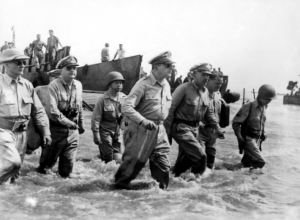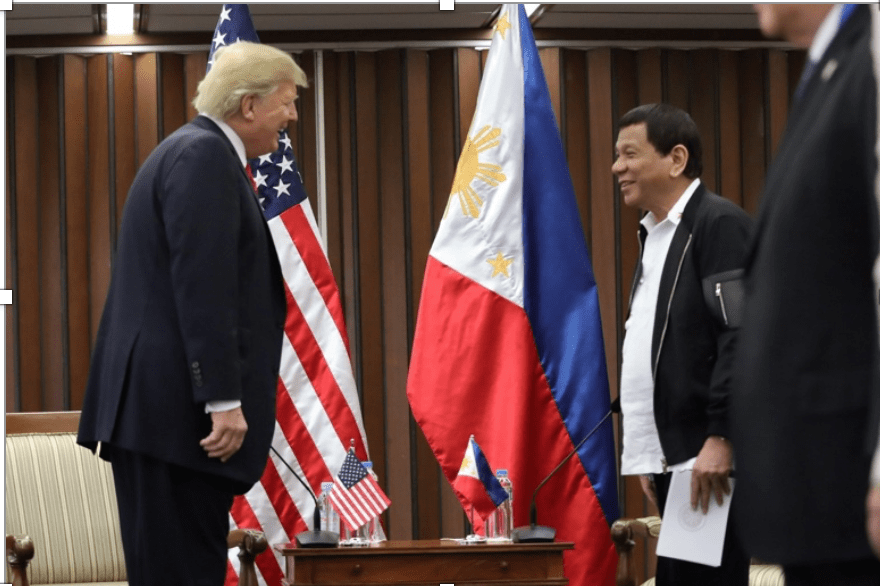By Barbara Alberts, M.A. Media and Strategic Communication ’20
In February, Philippines President Rodrigo Duterte announced he intended to terminate the 1998 Visiting Forces Agreement (VFA) between the Philippines and the United States. The VFA allowed the United States to station military forces in Philippine military bases, and the two militaries to execute joint military exercise and operations in the country. The U.S. military presence in the Philippines was also seen as a “security blanket” for the Philippines against China’s growing naval presence in the South China Sea. The termination would leave the United States with no legal or operational standing in the Philippines, but for some politicians in the Philippines, the ending of the agreement is seen as a step toward an independent Philippines divorced from the United States and its fate.
The image of the U.S. as a protector and ally of the Philippines has been rejected recently by Philippines government officials, citing the U.S. military as an unwelcome presence on the islands that perpetuates the idea of the United States as the Philippines’ colonizer rather than ally. The desire for independence from the United States that resulted in Duterte’s decision to terminate the Visiting Forces Agreement has roots in a deep master narrative of independence in the Philippines. A master narrative is a, “transhistorical narrative that is deeply embedded in a particular culture,” (Halverson 2011). According to Halverson, “our understanding of ourselves…who we are, what we are here for, what makes us unique, and so on, is entirely bound up in the narratives we grow up hearing and the stories we connect to them,” (Halverson 2011). When it comes to public diplomacy and communication with the Philippines, understanding the master narrative of independence in the Philippines is the first step in helping understand Duterte’s foreign policy decisions as they relate to the United States.
Independence: A Philippines Master Narrative
Since Duterte took office in 2016, he has been vocal about the Philippines becoming more independent from the United States. However, his decision to terminate the VFA is also part of a slow-moving process the Philippines has taken to distance itself militarily from the United States which began in the 1990s.

Historically, the United States has exerted its power through its military bases on the Philippines. U.S. Naval Base Subic Bay, located about two and a half hours outside of Manila, was one of the US’s largest overseas military bases before it was decommissioned in 1992, when the Philippines Senate rejected a treaty that would have seen the United States provide $203 million in aid in exchange for a 10-year lease on the base. At the time, Philippine senators saw American military presence in the Philippines, “as a vestige of colonialism and an affront to Philippine sovereignty,” (Sanger 1991).
The desire for separation from the United States is part of a greater master narrative in the Philippines of independence. In the Philippines, independence is a deeply rooted value, and gaining it has been a constant battle throughout its history. There is an abundance of independence stories in the Filipino culture. First, it was the quest to gain independence from Spain, which initially colonized the islands. Then, it was the struggle to shake the United States’ rule of the land. After the Philippines gained true independence from the United States in 1946, the drive for independence turned inward during the Marcos regime from 1965-1986, which ended when he was ousted during the People Power Revolution and Corazon Aquino took office. Now, the focus has shifted outward again, with Duterte seeking military independence from the United States. 
Conclusions and Recommendations
Populism in the Philippines has been trending upward since Duterte took office (Bieber 2018), and despite the majority of Philippines citizens preferring a stronger relationship with the United States over China, and nearly 70% of Philippines citizens believing the United States would defend them from China, Duterte has spurned any sort of U.S. involvement in the Philippines.

With memories of colonization still felt in the Philippines today, moving forward, the United States should make a concerted effort to approach any treaties, agreements, or negotiations with the Philippines as an interaction between two independent countries. The United States would benefit from emphasizing Philippine independence, and respecting the country’s movement toward independence. In terms of future military agreements, should the United States propose a new military partnership, they need to frame it as partnership between equals. The United States cannot achieve its military goals in the South Pacific without the cooperation of the Philippines, and the Philippines has benefitted from U.S. military presence in keeping China’s naval presence in the South China Sea at bay as well as helping with counterterrorism efforts in the country’s southern islands. By understanding the Philippines master narrative of independence, the United States can better communicate with their oldest ally in Asia.

Works Cited
Bieber, Florian. “Is Nationalism on the Rise? Assessing Global Trends.” Ethnopolitics, vol. 17, no. 5, 2018, pp. 519–540., doi:10.1080/17449057.2018.1532633.
Goodall, Jr, H.L., and Steven R. Corman. “What Is a Master Narrative.” Master Narratives of Islamist Extremism, by J. Halverson, Palgrave Macmillan, 2015, pp. 1–9.
Sanger, David E. “Philippines Orders U.S. to Leave Strategic Navy Base at Subic Bay.” The New York Times, The New York Times, 28 Dec. 1991, www.nytimes.com/1991/12/28/world/philippines-orders-us-to-leave-strategic-navy-base-at-subic-bay.html.
The opinions expressed in this blog are those of the author. They do not express the views of the Institute for Public Diplomacy and Global Communication or the George Washington University.

